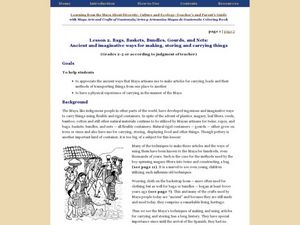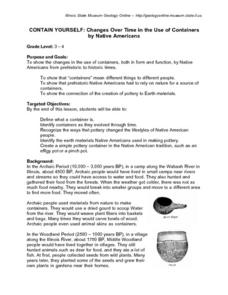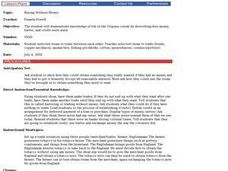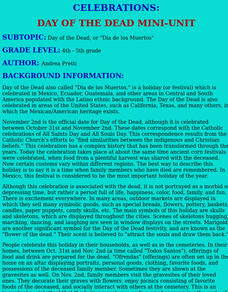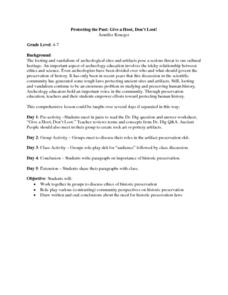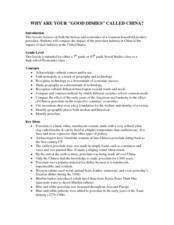Curated OER
Reading - Archeologist
For this online interactive archeologists worksheet, students respond to 8 fill in the blank and multiple choice questions regarding the information included in the provided paragraphs.
Curated OER
Native American Alphabetical Order Worksheet
In this online interactive Native American worksheet, students examine 16 Native American words and then write them in alphabetical order on the lines provided. This worksheet may also be printed for classroom use.
Curated OER
Native American Word Jumble
In this Native American worksheet, students read 20 words in a word box that pertain to Native American culture. Students unscramble the letters in 20 words and print them on the line.
Curated OER
Out and About: King Arthur
Students explore the legend of King Arthur. In this folklore lesson, students visit King Arthur's Great Halls, King Arthur's Labyrinth, and Glastonbury Abbey online or in person to discover details about the legendary tales.
Curated OER
Heroes and Hoplites for a Day
Students consider the accomplishments of the Greeks. In this ancient Greece lesson, students take a closer look at Greek artifacts, history, and culture as they visit the suggested museums and their websites.
Curated OER
Bags, Baskets, Bundles, Gourds, and Nets: Ancient and Imaginative Ways for Making, Storing, and Carrying Things
Students explore Mayan culture. In this Mayan world cultures lesson, students identify 5 methods by which the Mayan people carried things. Students view several drawings and photographs of these items, then describe how each item was...
Curated OER
Worksheet for Analysis of an Artifact
In this primary source analysis worksheet, students respond to 20 short answer questions that require them to analyze an artifact of their choice.
Curated OER
Contain Yourself: Changes Over Time in the Use of Containers by Native Americans
Learners examine the types of containers used by Native Americans. They discover how their form and function has changed over time. They create their own container based on the Native American examples.
Curated OER
Chinese And Japanese Tomb Cultures
Students examine burial customs in ancient China and Japan comparing those customs to burial traditions from other cultures. This lesson leads to group creative projects of mock "tombs".
Curated OER
NCTA Lesson Plan on Korea
Students are introduced to the unique aspects of the Korean culture. Using the websites included in the lesson they research categories of subjects that are related to the culture.
Curated OER
Buying Without Money
Students describe life in the Virginia colony. They explain how money, barter, and credit were used. Students simulate trading items among classmates. Students compare/contrast credit and trade.
Curated OER
Interpreting An Archaelogical Site
Pupils study the site of an archaeological dig site in order to begin looking at how they can be interpreted. They look at a soil profile and respond to a research question that simulates a real site. The other questions are used to help...
Curated OER
Day of the Dead
Young scholars explore Day of the Dead, also called "Dia de los Muertos," which is a holiday (or festival) celebrated in Mexico, Ecuador, Guatemala, and other areas in Central and South America populated with the Latino ethnic background.
Curated OER
UMNH: Cultural Clutter - Tales In The Trash
Fourth graders list three or more types of evidence of prehistoric cultures that encouraged archaeologists to investigate the marshes around the Great Salt Lake. They also explain why it is important not to disturb archaeological remains.
Curated OER
Times Are Changing
Third graders study the need for trade, cultural and intellectual achievements. They study scientific and technological advancements emphasizing how these achievements affect modern day.
Curated OER
The Archaeology of Cactus Ruin
Young scholars simulate archaeologists by excavating a paper site. In groups, they use a sampling strategy to determine information about the people who lived at the site.
Curated OER
Saving the Past for the Future
Students examine the need for preservation of archaeological resources. They discuss and propose possible solutions to a given ethical dilemma.
Curated OER
Changes in Arkansas Indian Life during the Mississippian Tradition
Students research and describe major causes and effects of change in the lives of the Arkansas Indian Culture during the Mississippian Tradition.
Curated OER
Site Robbers
Fourth graders interview a Native American and write a newspaper article or letter that expresses concern about robbing archaeological sites.
Curated OER
Home Healing and Family Stories
Students explore their family history by examining home remedy traditions. They read and discuss a handout about home remedies, conduct an interview with a family member, and complete an interview worksheet.
Curated OER
Protecting the Past: Give a Hoot, Don't Loot
Students discuss the looting and vandalism of various archeological sites. In pairs, they read and complete a worksheet and review their answers as a class. In groups, they role play a artifact preservation skit and perform it to their...
Curated OER
Everyday Objects As Artwork
Students examine everyday Chinese objects and analyze why they are
considered artwork today in this multi-subject lesson for Middle School. Small group colaboration is emphasized.
Curated OER
Why Are Your "Good Dishes" Called China?
Students link monopoly as a result of geography and technology. They recognize technology as a determinant of economic success. Students recognize cultural diffusion based upon societal wants and needs. They compare and contrast methods...
Curated OER
Gifts From China To The West
Students identify Chinese inventions that are widely used today and explore how
these inventions influenced social development in the West in this Social Studies lesson using cooperative learning techniques.
Other popular searches
- Greek Pottery
- Clay Pottery
- Ceramics Pottery
- Pottery Craft
- Pottery Wheel
- Ceramic Pottery
- Chinese Pottery
- History of Pottery
- Pottery Clay Class
- Pottery, Archeology
- Native American Pottery
- Korean Pottery







